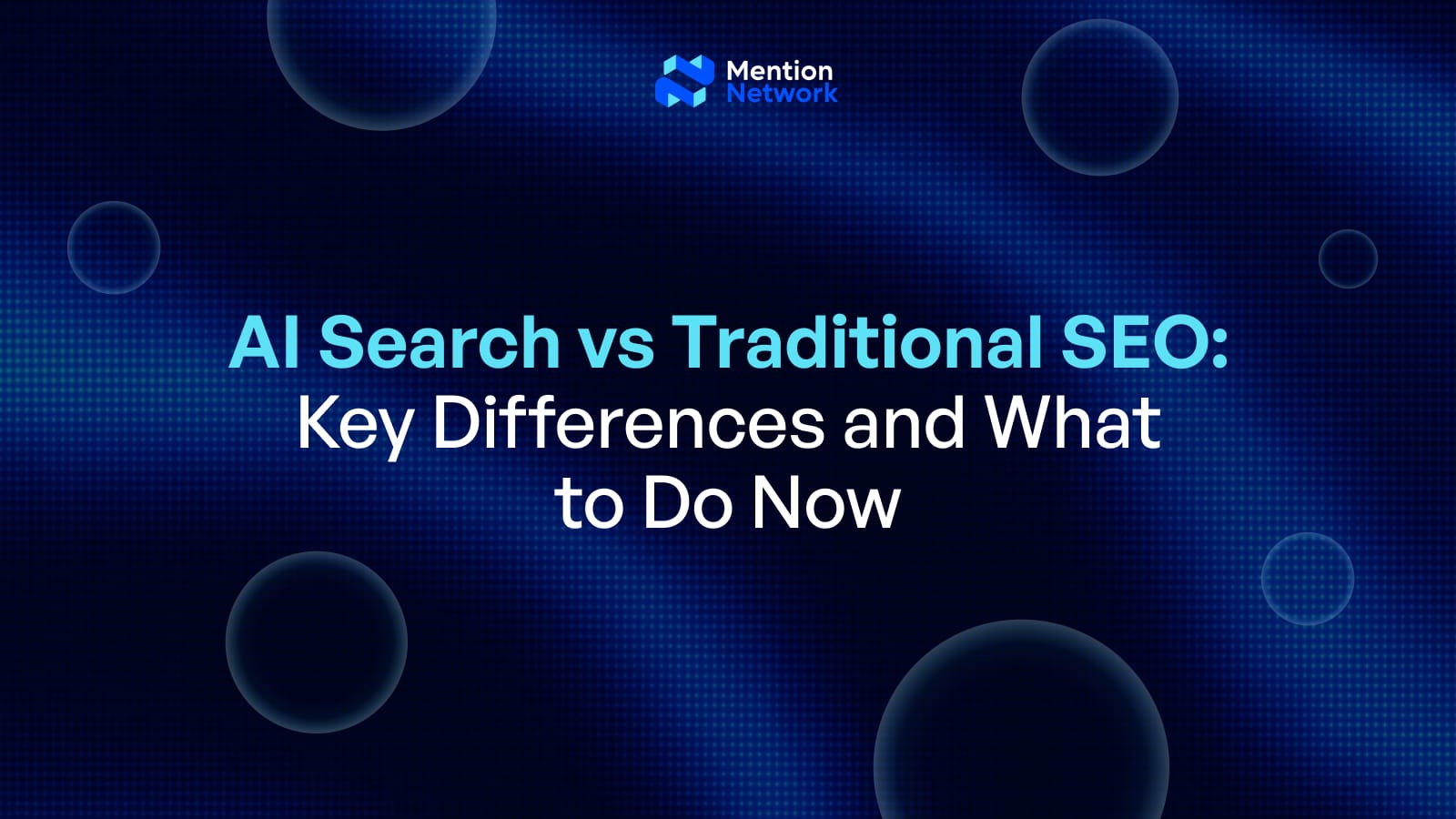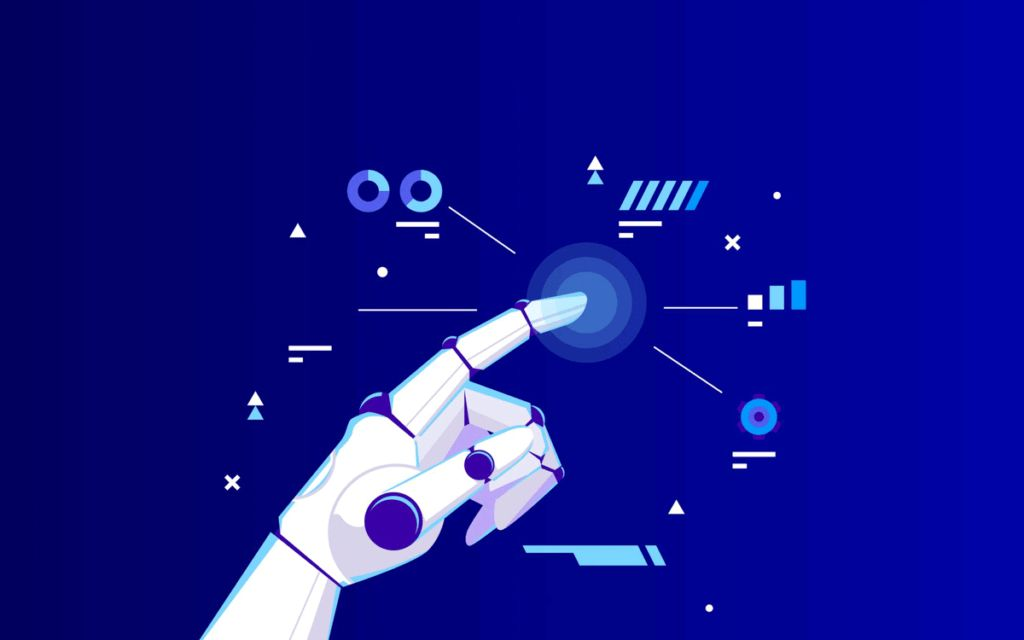AI Search vs Traditional SEO: Key Differences and What to Do Now

Google still processes more than 5 trillion searches a year, dominating global information retrieval. Meanwhile, ChatGPT has become the 5th most visited website in the world, with 5.8 billion monthly visits and explosive adoption curves.
Yet here’s the surprising paradox:95 percent of ChatGPT users still use Google regularly, and AI-driven referral traffic accounts for less than 1 percent of website visits for most brands.
Search is not dying. It’s fracturing and that fracture demands a new mindset. This article breaks down what is truly changing, what still matters, and what you need to do right now.
- Traditional SEO ranks pages, AI search cites authoritative sources in answers.
- Only 25 percent of pages ranking #1 on Google appear in AI search answers.
- AI generates just 1 percent of site traffic today, but ChatGPT users are twice as likely to click through when they do.
- The most effective strategy is not choosing SEO or AI, it is integrating both.
- Teams must shift from “best page” thinking to “best answer” thinking.
How Search Behavior Is Fundamentally Changing

Search is no longer a single channel. It is a set of parallel discovery systems that users switch between depending on intent.
Google’s search experience remains familiar:
- A list of blue links
- Ads
- Featured snippets
- And increasingly, AI Overviews (now showing on roughly 25 percent of queries)
But the distribution varies dramatically by industry:
- Healthcare: 49 percent of searches trigger AI Overviews
- Real estate: just 4 percent
- Finance: fluctuating as Google tunes safety and reliability thresholds
Users scan, evaluate, and click through the classic SERP behavior.
AI search experiences such as ChatGPT, Perplexity, and Claude are different. Users ask conversational questions and expect an immediate, synthesized answer that pulls from multiple credible sources with or without clicking through.
This is not a fringe behavior anymore:
- ChatGPT handles 1 billion messages per day
- 800 million weekly active users
- 82 percent of surveyed users say AI search feels “more helpful”
The behavioral divide looks like this:
And here’s what most marketers misunderstand: Users are not choosing one over the other. They use both. Constantly.
- 95.3 percent of ChatGPT users also use Google
- Only 14.3 percent of Google users use ChatGPT
- AI users often cross-check answers on traditional search
This “dual behavior” means you can no longer treat search as a single channel with a single strategy.
Traditional SEO vs AI Search Optimization: The Core Differences

The shift is deeper than algorithm changes. It is philosophical.
Traditional SEO is about ranking pages.AI search optimization is about being chosen as a trusted source worthy of citation inside an answer.
Traditional SEO Priorities
- Keyword targeting
- Backlink acquisition
- Site speed and technical health
- Meta optimization
- Content depth and comprehensiveness
- Featured snippet capture
It still works. It still matters. It still drives the majority of traffic.
Ranking strong on Google also increases your likelihood of being cited by AI systems, but the correlation is weaker than expected. Across 25,000 queries, researchers found:
- Websites ranked #1 on Google appeared in AI answers only 25 percent of the time.
- Even top-10 pages were often ignored.
Why? Because AI search focuses on answers, not pages.
What AI Search Optimization Really Means
AI platforms evaluate your brand at the entity level, not the page level. They analyze:
- Domain-wide reputation
- Historical accuracy
- Author expertise
- Consistency across platforms
- Third-party mentions
- Original data contributions
You can think of this as your digital credit score.
If SEO is about being discoverable, AI search optimization is about being trustworthy enough to quote.
Why Traditional SEO Still Matters
- Google delivers 83.8 billion monthly visits; ChatGPT delivers 5.8 billion.
- Organic search drives 33–42 percent of all site traffic.
- Strong rankings improve AI citability.
- Conversion events still overwhelmingly happen after a click.
- E-commerce and local search depend almost entirely on traditional SEO.
What AI Search Optimization Adds
- Brand exposure in zero-click environments
- Protection from misinformation in AI models
- Opportunities to be cited across multiple AI platforms
- Increasing relevance for high-intent users
- Future-proofing for next-gen search experiences
The two approaches overlap but are not interchangeable. SEO builds the base. AI optimization builds the authority layer on top of that base.
What the Data Actually Shows (Not the Hype)
AI search is growing, but the reality is more nuanced than headlines imply.
Current AI Traffic: Small but Accelerating
- AI referrals: 1.08 percent of website visits
- ChatGPT: 87.4 percent of all AI referral traffic
- Google AI Overviews: highly variable by industry
Growth Trajectory
- ChatGPT outbound clicks grew 558 percent YoY
- Google outbound clicks grew 66 percent in the same period
Click Behavior
- Google averages 0.6 outbound visits per user
- ChatGPT users average 1.4 visits out per user
Smaller volume, but higher intent.
Industry Variance
- IT: 2.8 percent of traffic from AI referrals
- Consumer staples: 1.9 percent
- Communication services: 0.25 percent
- Healthcare: 48.7 percent of queries trigger AI Overviews
Citation Patterns Across AI Models
AI consistently favors:
- Amazon, Walmart, Best Buy in consumer topics
- Mayo Clinic and Cleveland Clinic in health
- NerdWallet and Bankrate in finance
- Google, Microsoft, Adobe in tech
- McKinsey and Deloitte in B2B
These patterns show what AI systems trust:credible, consistent, research-backed brands.
The Big Opportunity
If only 25 percent of #1 Google results appear in AI answers, then 75 percent are wide open for takeover.
This gap is where the next generation of search winners will emerge.
What You Need to Do Differently for AI Search

The goal is not to replace SEO. The goal is to extend SEO into answer-first ecosystems.
Here are the pillars of modern visibility:
1. Build Your Digital Authority Score
AI systems analyze entire domains, not individual articles. Signals they prioritize:
- Expertise-backed bylines
- Consistent publication over time
- High-authority third-party mentions
- Clean technical architecture
- Verified factual accuracy
- Aligned data across your brand footprint
Immediate actions
- Allow GPTBot, CCBot, and anthropic-ai in robots.txt
- Strengthen author bios with clear expertise markers
- Publish consistently in defined topic areas
- Audit site structure for clarity and internal coherence
2. Adopt an Answer-First Content Architecture
AI extractors don’t want 3,000 words of context. They want the exact answer to the exact question, early in the article.
This is BLUF - bottom line up front.
Answer-first strategies:
- Lead every section with the direct answer
- Use clear question-based H2s
- Embed FAQ schema
- Add data tables, definitions, and short factual blocks
- Avoid burying key information deep in the article
Traditional SEO rewards depth. AI search rewards precision plus depth.
3. Build Authority Beyond Your Website
AI systems heavily weight off-site signals, including:
- Expert quotes
- Interviews
- Guest articles
- Research collaborations
- Academic citations
- Mentions in reputable publications
This expands your entity strength, which is central to AI source selection.
Think of this as modern digital PR meets semantic authority building.
4. Optimize for Context, Not Just Keywords
AI search uses multi-query fan-out, meaning one user question triggers many internal searches before the answer is generated.
That means models don’t just scan your page. They scan your topic ecosystem.
How to optimize for contextual understanding:
- Build deep topic clusters
- Link related articles meaningfully, not randomly
- Use semantic keywords naturally
- Map content around user intent, not volume
- Create clear topical boundaries on your site
Your site should feel like a knowledge graph, not a list of blog posts.
5. Establish Citation-Worthy Standards
AI platforms avoid hallucinations by citing reliable, accurate, well-sourced content.
To be chosen:
- Cite primary data
- Provide external references
- Use consistent statistics across platforms
- Avoid sensational claims
- Explain methodologies when presenting research
Every claim should be verifiable. Consistency builds trust. Trust drives citations.
The Future: Integration, Not Replacement
The brands winning today aren’t choosing between SEO and AI search. They are building an integrated system where:
- Traditional SEO drives scalable traffic
- AI search visibility builds brand authority and trust
- Third-party mentions reinforce entity strength
- Structured content supports extraction
- Semantic depth supports ranking
- Answer-first clarity supports AI citation
This requires new operational workflows:
- PR, SEO, and content must collaborate
- Analytics must track traditional metrics and AI visibility
- Teams must publish with both humans and machines in mind
The search battlefield is widening, not shrinking.
A Forward-Looking View: The Opportunity in Uncertainty
Search is splintering into:
- Traditional SERPs
- AI answer engines
- Product search
- Social discovery
- Verticalized AI models
- Multimodal voice and image queries
This complexity is not a threat, it is an advantage for brands that adapt early.
The truth that spans every platform is simple:
Expertise, accuracy, and clarity win. Authority compounds. Trust is the new ranking factor.
If you consistently produce valuable, well-structured, expert-backed content, you will win in both worlds, the old and the new.
Because the future of search is not about choosing sides. It is about being visible wherever users decide to look.
Frequently Asked Questions
Is traditional SEO dead?
No. Google still drives the majority of global traffic. SEO remains essential for discoverability and conversions.
How do I check if my content appears in AI answers?
Use AI monitoring tools like Momentic, Conductor, or ZipTie, or manually ask AI platforms your core queries.
What is the main difference between optimizing for Google vs AI?
Google ranks pages. AI search cites authoritative answers and domain-level expertise.
Should I allow AI crawlers?
Yes. Blocking GPTBot, CCBot, or anthropic-ai eliminates your chances of being included in AI answers.
How long to see AI optimization results?
Expect 3–6 months. AI search authority builds gradually, similar to SEO, but with emphasis on consistency and reputation.

